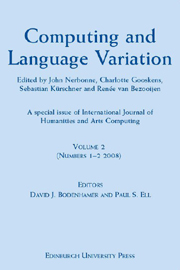Book contents
- Frontmatter
- Contents
- From the Editors
- Notes on Contributors
- 1 Introduction: Language Variation Studies and Computational Humanities
- 2 Panel Discussion on Computing and the Humanities
- 3 Making Sense of Strange Sounds: (Mutual) Intelligibility of Related Language Varieties. A Review
- 4 Phonetic and Lexical Predictors of Intelligibility
- 5 Linguistic Determinants of the Intelligibility of Swedish Words among Danes
- 6 Mutual Intelligibility of Standard and Regional Dutch Language Varieties
- 7 The Dutch-German Border: Relating Linguistic, Geographic and Social Distances
- 8 The Space of Tuscan Dialectal Variation: A Correlation Study
- 9 Recognising Groups among Dialects
- 10 Comparison of Component Models in Analysing the Distribution of Dialectal Features
- 11 Factor Analysis of Vowel Pronunciation in Swedish Dialects
- 12 Representing Tone in Levenshtein Distance
- 13 The Role of Concept Characteristics in Lexical Dialectometry
- 14 What Role does Dialect Knowledge Play in the Perception of Linguistic Distances?
- 15 Quantifying Dialect Similarity by Comparison of the Lexical Distribution of Phonemes
- 16 Corpus-based Dialectometry: Aggregate Morphosyntactic Variability in British English Dialects
4 - Phonetic and Lexical Predictors of Intelligibility
Published online by Cambridge University Press: 12 September 2012
- Frontmatter
- Contents
- From the Editors
- Notes on Contributors
- 1 Introduction: Language Variation Studies and Computational Humanities
- 2 Panel Discussion on Computing and the Humanities
- 3 Making Sense of Strange Sounds: (Mutual) Intelligibility of Related Language Varieties. A Review
- 4 Phonetic and Lexical Predictors of Intelligibility
- 5 Linguistic Determinants of the Intelligibility of Swedish Words among Danes
- 6 Mutual Intelligibility of Standard and Regional Dutch Language Varieties
- 7 The Dutch-German Border: Relating Linguistic, Geographic and Social Distances
- 8 The Space of Tuscan Dialectal Variation: A Correlation Study
- 9 Recognising Groups among Dialects
- 10 Comparison of Component Models in Analysing the Distribution of Dialectal Features
- 11 Factor Analysis of Vowel Pronunciation in Swedish Dialects
- 12 Representing Tone in Levenshtein Distance
- 13 The Role of Concept Characteristics in Lexical Dialectometry
- 14 What Role does Dialect Knowledge Play in the Perception of Linguistic Distances?
- 15 Quantifying Dialect Similarity by Comparison of the Lexical Distribution of Phonemes
- 16 Corpus-based Dialectometry: Aggregate Morphosyntactic Variability in British English Dialects
Summary
Abstract In the present investigation, the intelligibility of 17 Scandinavian language varieties and standard Danish was assessed among young Danes from Copenhagen. In addition, distances between standard Danish and each of the 17 varieties were measured at the lexical level and at different phonetic levels. In order to determine how well these linguistic levels can predict intelligibility, we correlated the intelligibility scores with the linguistic distances and we carried out a number of regression analyses. The results show that for this particular set of closely related language varieties phonetic distance is a better predictor of intelligibility than lexical distance. Consonant substitutions, vowel insertions and vowel shortenings contribute significantly to the prediction of intelligibility.
INTRODUCTION
Gooskens (2007) correlated lexical and phonetic distances with mutual intelligibility scores for the Mainland Scandinavian standard languages, Danish, Norwegian and Swedish. Subjects from different places in Denmark, Norway and Sweden listened to the two standard languages spoken in the neighbouring countries and linguistic distances were measured between the language varieties of the listeners and the test languages. In total there were 18 mean intelligibility scores and 18 corresponding linguistic distances. The distances were measured at the two linguistic levels that are generally taken to be most important for mutual intelligibility in Scandinavia, namely the lexical and the phonetic level (Delsing and Lundin Åkesson, 2005; Torp, 1998). The results showed a high correlation between intelligibility scores and phonetic distances (r = −.80, p < .01).
- Type
- Chapter
- Information
- Computing and Language VariationInternational Journal of Humanities and Arts Computing Volume 2, pp. 63 - 82Publisher: Edinburgh University PressPrint publication year: 2009



